Table of Contents
Daily Current Affairs for Government Exams:
Today Current Affairs: 16th January 2020 for UPSC IAS exams, State PSC exams, SSC CGL, State SSC, RRB, Railways, Banking Exam & IBPS, etc.
Contents:
- Henley Passport Index.
- Harivarasanam Award for 2020.
- Bru Refugee Crisis.
- 5th Annual Day of CARA.
- Women, Business and the Law 2020.
- India’s fiscal deficit.
- Harmonized System of Nomenclature(HSN) code.
- The 5th Science Film festival starts in Goa.
- Janak Raj to be the third internal member of the monetary policy committee:.
- other important current affairs.
1. Henley Passport Index:

The latest edition of the Henley Passport Index, widely acknowledged to be the most reliable of such rankings, was released recently.
- According to Henley & Partners, the residence and citizenship planning firm that publishes the ranking, the Index lists the world’s passports “according to the number of destinations their holders can access without a prior visa”.
- The ranking is based on data from the International Air Transport Association (IATA), a trade association of some 290 airlines, including all major carriers.
- The index includes 199 different passports and 227 different travel destinations.
- The data are updated in real-time as and when visa policy changes come into effect.
Key findings:
- Japan has been topping the Index for three straight years; according to the 2020 index, its citizens are able to access 191 destinations without having to obtain a visa in advance.
- Singapore is in second place. Germany and South Korea are ranked at No. 3.
- Afghanistan, at rank 107, has the world’s weakest passport.
- The Indian passport is ranked 84th in the world. It was ranked higher in both 2019 (82 ranks) and 2018 (ranked at 81). Since the index began in 2006, the Indian passport has ranked in a band of 71st to 88th.
2. Harivarasanam Award for 2020 :
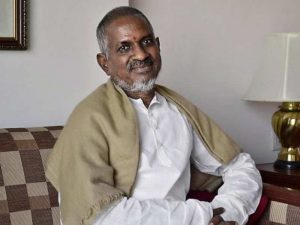
Renowned music composer Ilaiyaraaja was awarded the Harivarasanam Award for 2020 by the Kerala Government.
About Harivarasanam:
- ‘Harivarasanam’ is a Malayalam devotional song written in eight stanzas, called ‘Ashtakam’.
- It was written by Kambakudi Kulathur Srinivasa Iyer, a guruswami, in 1947.
- It is recited at Sabarimala (the principal Ayyappan pilgrimage site), before closing the temple door every night.
- Harivarasanam Award is given to a person for their contribution to propagating the spirit of secularism, equanimity, and the universal brotherhood of Sabarimala through the songs.
- The Cash prize is ₹1,00,000.
- It is Instituted by Kerala state government and the Travancore Devaswom Board.
- It was Instituted in 2012.
3. Bru Refugee Crisis:
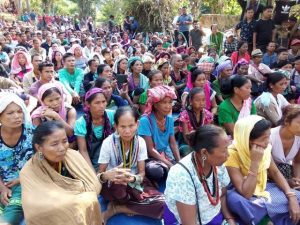
A four-party agreement among the Centre, Mizoram Government, Tripura Government, and Mizoram Bru Displaced People’s Forum (MBDPF) which seeks to end the 22-year-old Bru refugee crisis may be signed on 16th January 2020
- Bru or Reang is a community indigenous to Northeast India, living mostly in Tripura, Mizoram, and Assam.
- In Tripura, they are recognized as a Particularly Vulnerable Tribal Group.
- In Mizoram, they have been targeted by groups that do not consider them indigenous to the state.
- In 1997, following ethnic clashes, nearly 37,000 Brus fled Mamit, Kolasib and Lunglei districts of Mizoram and were accommodated in relief camps in Tripura.
- Since then, 5,000 have returned to Mizoram in eight phases of repatriation, while 32,000 still live in six relief camps in North Tripura.
- In June 2018, community leaders from the Bru camps signed an agreement with the Centre and the two-state governments, providing for repatriation in Mizoram. But most camp residents rejected the terms of the agreement.
- The camp residents say that the agreement doesn’t guarantee their safety in Mizoram.
- In October 2019, the supply of ration to relief camps was stopped on instructions of the Home Ministry in a bid to hastily complete the repatriation of refugees to Mizoram.
- Civil society outfits had alleged that at least six refugees died due to starvation.
- According to the 2018 agreement, the Bru tribals would have settled in Mizoram, but according to the new agreement, they will now settle in Tripura.
- The stakeholders in the issue expect a package of Rs 600 crore from the Centre which includes:
- Plots of 2,500 sq ft for each Bru family in addition to agricultural land.
- A stipend of Rs 5,000 per month and free ration for each family for the next two years.
- Bru tribals would be included in Tripura’s voter list.
4. 5th Annual Day of CARA:
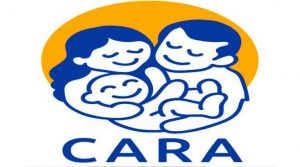
The Central Adoption Resource Authority (CARA) has celebrated its 5th Annual Day recently.
- CARA has conducted various training programs and workshops at national and state levels for all the stakeholders of the adoption program.
- It has also carried out a number of advocacy programs through various mediums for creating awareness and sensitization of the general public.
- It is giving emphasis to the rehabilitation of older and special needs children in various Child Care Institutions across the country.
Central Adoption Resource Authority (CARA):
- Central Adoption Resource Authority (CARA) has been set up as a statutory body of the Ministry of Women and Child Development.
- It functions as a nodal body for the adoption of Indian children and is mandated to monitor and regulate in-country and inter-country adoption.
- CARA is designated as the Central Authority to deal with inter-country adoptions in accordance with the provisions of the Hague Conventions on Inter-Country Adoptions, 1993, ratified by the Government of India in 2003.
- CARA primarily deals with adoption of orphan, abandoned and surrendered children through its associated /recognized adoption agencies
5. Women, Business and the Law 2020:
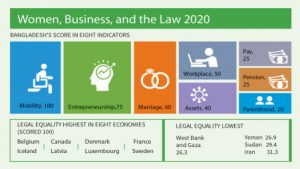
Women, Business and the Law 2020, the sixth edition in a series, has been released.
- Women, Business and the Law (WBL) is a World Bank Group project collecting unique data on the laws and regulations that restrict women’s economic opportunities.
About the Women, Business and the Law Index:
- The index analyzes laws and regulations affecting women’s economic inclusion in 190 economies.
- It is composed of eight indicators structured around women’s interactions with the law as they begin, progress through and end their careers, aligns different areas of the law with the economic decisions women make at various stages of their lives.
The indicators are:
- Mobility, Workplace, Pay, Marriage, Parenthood, Entrepreneurship, Assets, and Pension.
How are countries ranked?
- The study tracked “how laws affect women at different stages in their working lives and focusing on those laws applicable in the main business city”.
- The Index is based on the countries’ formal laws and regulations that have a bearing on women’s economic participation.
Performance of various countries:
- No economy in ‘East Asia and the Pacific’, ‘Europe and Central Asia’, or ‘Latin America and the Caribbean’ were among top reformers, the report claimed.
- Only eight economies scored a perfect 100 —Belgium, Canada, Denmark, France, Iceland, Latvia, Luxembourg, and Sweden.
- Those countries have ensured equal legal standing to men and women on all the eight indicators of the index.
- India is placed 117th among 190 countries.
- It scored 74.4 on a par with Benin and Gambia and way below least developed countries like Rwanda and Lesotho.
6. India’s fiscal deficit:
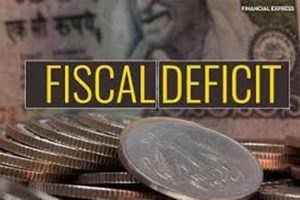
Former Economic Affairs Secretary S C Garg has stated that the true fiscal deficit for 2018-19 is 4.7%.
- According to Garg, for the current financial year, too, the actual fiscal deficit is likely to range between 4.5 percent to 5 percent of GDP.
- Contrary to these views, the Indian government says, the fiscal deficit just 3.4 percent of the gross domestic product (GDP) for 2018-19.
- For the current year, the Union Budget presented in July expected the fiscal deficit to be 3.3 percent of the GDP.
- For long, it has been suspected that the official figures hide the true fiscal deficit.
- That’s because some of the government’s expenditure was funded by the so-called “off-budget” items.
- As a result, while this extra expenditure did not figure in the official calculations, it did mean that the true fiscal deficit or borrowing by the public sector was higher than the level presented in the Budget.
What is the fiscal deficit?
- It is the difference between the Revenue Receipts plus Non-debt Capital Receipts (NDCR) and the total expenditure.
- In other words, the fiscal deficit is “reflective of the total borrowing requirements of Government”.
7. Harmonized System of Nomenclature(HSN) code:

India will not allow imports without HSN code. This will enable India’s exports to be accepted globally due to the quality of goods and services.
- HSN code stands for “Harmonized System of Nomenclature”.
- This system has been introduced for the systematic classification of goods all over the world.
- HSN code is a 6-digit uniform code that classifies 5000+ products and is accepted worldwide.
- It was developed by the World Customs Organization (WCO) and it came into effect from 1988.
- It is a six-digit identification code. Of the six digits, the first two denote the HS Chapter, the next two give the HS heading, and the last two give the HS subheading.
- The main purpose of HSN is to classify goods from all over the World in a systematic and logical manner.
- This brings in a uniform classification of goods and facilitates international trade.
8. 5th Science Film festival starts in Goa:

The 5th edition of the Science Film Festival of India has been started in Panaji, Goa.
- The objective of the festival is instilling knowledge of science among the youth with the help of exhibitions, masterclasses, workshops, and other activities.
- A special workshop ‘Million SoUL’ will also be conducted by IIT Bombay on training about making solar lamps.
9. Janak Raj to be the third internal member of the monetary policy committee:
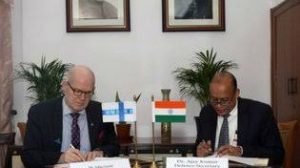
Janak Raj is currently serving as Reserve Bank of India’s principal adviser in the monetary policy department.
- Janak Raj is expected to be appointed as the third internal member of the central bank in the monetary policy committee (MPC).
- He will replace Michael Patra, the executive director of the monetary policy department, who was elevated as deputy governor.
Monetary Policy Committee (MPC):
- The MPC consists of 6 members, out of which three are RBI’s internal members and three are external experts.
- As per the law, by default, the Governor and the Deputy Governor of RBI who are in-charge of monetary policy are the two RBI internal members of MPC.
- The third member could be any RBI officer.
- Therefore, RBI Governor Shaktikanta Das and deputy Governor Michael Patra are the two RBI internal members of MPC.
Other important current affairs:
1. The State of Culture and Tourism minister launched a month-long exhibition on Indian Heritage in New Delhi.
- The exhibition was launched in digital space and will stay online until February 15, 2020.
- This exhibition is the first of its kind in the country.
- The visitors of the exhibition will find architectural and conjectural reconstructions, recreations of socio-cultural traditions and life of Hampi and also many more murals.
- Through this, the exhibition will take heritage to the wider population.
2. The US has signed the first phase of a trade deal with China.
- It includes Intellectual Property (IP) Protection and Enforcement, rebalancing the US-China trade relationship and effective dispute resolution.
- The deal was signed by President Trump and Chinese Vice Premier Liu He at the White House in Washington.
3. Odisha’s Puri District has received ‘Swachhata Darpan Awards 2019’ from the Department of Drinking Water and Sanitation (DDWS) for innovations and initiatives for plastic waste management.
- Puri has been awarded for successfully managing the plastic wastes in the district
- The Swachhata Darpan Award 2019 was presented by Indian Bollywood actor Aamir Khan.
4. Russian Prime Minister Dmitry Medvedev submitted his resignation to President Vladimir Putin.
- According to the Tass news agency, Mr. Putin will name Mr. Medvedev as deputy of the presidential Security Council.
- Russian President asked Medvedev’s Cabinet to keep working until the new Cabinet is formed.
5. Ladakh is hosting the first-ever Food Processing Summit to attract investors to the region.
- The event is aimed at encouraging the entrepreneurs to begin a StartUp to tap the potential in the Food Processing Industries in Ladakh.
- Ladakh region has vast scope for investment in food Processing Industries in horticulture products (Apricot, SeabuckThorn, Apple) and agricultural produce (buckwheat and barley).
6. PS officer Anand Prakash Maheshwari took over as the new director-general of the Central Reserve Police Force (CRPF), the world’s largest paramilitary force on 15 January 2020.
- He will retire in February 2021.
- He will replace ITBP Director General S S Deswal who was given the additional charge to head the CRPF.
7. Indo-Japan joint-exercise Sahyog-Kaijin began on 16 January 2020 at the Chennai port.
- This is the 19th edition of the exercise that is being conducted between the two Coast Guards.
- Aim: The exercise is aimed at further strengthening bilateral ties and mutual understanding between the two coast guards.
- It also aims to enhance interoperability in communication, search and rescue procedures and sharing of best practices.
8. The Union Minister of State (Independent Charge) Development of North Eastern Region (DoNER), Atomic Energy and Space, Dr. Jitendra Singh announced that the training for Gaganyaan space astronauts will start their training from the third week of January 2020.
- The training of the Indian astronauts for India’s first human space mission will take place in Russia.
- India has selected four astronauts for the human space mission.
9. 6 people were killed and 10 are believed to be missing after a bus and some pedestrians were swallowed by a sinkhole in China’s Xining city on January 13, 2020.
- Sinkholes are depressions formed in the ground when layers of the Earth’s surface start collapsing into caverns.
- They can occur suddenly and without warning because the land under the surface of the Earth can stay intact for a period of time until the spaces get too big.
- Their formation can be caused due to natural processes or human activity.
- Sinkholes can also be formed due to human activity.
- This can happen due to broken land drains, water mains and sewerage pipes, increased rainfall, storm events, underlying limestone, and diverted surface water, among other reasons.
10. Recently, the Government has launched the bidding process offering 11 areas in oil and gas blocks.
- The 11 blocks under Open Acreage Licensing Policy Round-V (OALP-V) are spread across 8 sedimentary basins and include eight on land blocks, two shallow-water blocks and one ultra-deepwater block.
- The government has awarded 94 blocks so far under the Hydrocarbon Exploration & Licensing Policy (HELP) regime




